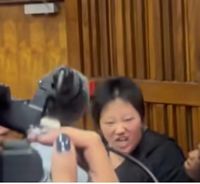The Johannesburg High Court was the scene of high drama this week as seven Chinese nationals received 20-year prison sentences for orchestrating a human trafficking and forced labor scheme that exploited dozens of undocumented Malawian migrants. The sentencing, which took place on September 10, 2025, marked the conclusion of a years-long investigation into a sprawling criminal operation that shocked South Africa and drew attention to the persistent challenges of labor exploitation and cross-border trafficking in the region.
According to reporting from the Associated Press, the convicted group—identified in court records as Shu-Uei Tsao (42), Biao Ma (50), Hui Chen (50), Quin Li (56), Zhou Jiaquing (46), Junying Dai (58), and Zhilian Zhang (51)—was found guilty of trafficking 91 undocumented Malawian nationals between 2017 and 2019. Prosecutors revealed that the victims were lured to South Africa with false promises and then forced to work under brutal conditions at a cotton fabric factory in Village Deep, an industrial area in the south of Johannesburg.
The details that emerged during the trial painted a grim picture. The Malawian workers, many of whom had previously been employed at Chinese-owned factories in Malawi, were transported to South Africa in windowless trucks—a harrowing journey that ended with their confinement in a high-walled, razor-fenced compound. The factory, which operated under the name Beautiful City (Pty) Ltd, was unregistered and shielded from public view. Once inside, the migrants said they were not allowed to leave, forced to work 11-hour shifts seven days a week, and made to operate defective machinery without any protective equipment.
“We were not allowed to bring in any food from outside, and we were forced to work even on holidays,” one victim recounted during the proceedings, according to AP. The workers also described a regime of strict control: armed guards monitored their every move, personal communication was banned, and any attempt to leave was met with threats and intimidation. Many suffered injuries from the unsafe machinery, and the lack of proper training only heightened the risks they faced on the job.
The November 12, 2019, raid that brought the operation to light was the result of a coordinated effort by the South African Police Service, the Hawks, the Department of Employment and Labour, and Home Affairs. Acting on a tip-off about possible human trafficking and forced labor, authorities stormed the Village Deep factory and discovered more than 100 undocumented immigrants locked inside—including 37 children, as reported by IOL News. The scale of the operation stunned even seasoned investigators, who noted that many of the Malawian nationals had been smuggled into South Africa in shipping containers.
Prosecutors, who had sought life sentences for the defendants, charged them with a staggering 160 counts, including human trafficking, child labor, operating an unregistered business, failing to keep financial records, and maintaining unsafe working conditions. The court ultimately sentenced each of the seven to 20 years in prison—a decision that drew both praise and controversy in equal measure.
The atmosphere inside the courtroom on sentencing day was tense, but it quickly devolved into chaos when Nancy Xiao, who identified herself as the daughter of one of the convicted men, confronted journalists and accused South African authorities of framing her family. According to coverage from IOL News and Cape Argus, Xiao was visibly upset as she addressed the media, insisting that the real mastermind behind the trafficking ring was still at large in Johannesburg.
“They are all lying,” Xiao shouted, referring to the authorities and the charges. She alleged that the true owner of the illegal factory—a man she identified only as the "big boss"—remained free and continued to operate a business called China Shield in Bruma, a suburb east of Johannesburg. "The owner is right here in this country… They are all employees. He is still running a business here. The boss is right here in this country," Xiao declared, as police tried unsuccessfully to prevent her from speaking further.
Pulled further into the spotlight by reporters' questions, Xiao doubled down on her claims, alleging that the so-called big boss had a gun-related background and was well-known in the Chinese community in South Africa. She even produced a photograph on her phone, purportedly showing the man in question and the storefront of China Shield, though the image was reportedly unclear. "They (referring to the convicted group) are afraid to report him because they’re going to be killed by this boss," she said. "So they keep silent all this time."
The authorities, for their part, have not commented publicly on Xiao’s allegations, and no additional arrests have been made in connection with her claims. The police focus, as evidenced by the multi-agency raid and subsequent prosecution, has remained on the now-convicted group and the conditions uncovered at Beautiful City (Pty) Ltd. According to the Cape Argus, the operation was notable not only for its size but for the egregious violations of labor and immigration laws, with children and adults alike subjected to confinement, deprivation, and forced labor.
The case has raised uncomfortable questions about the effectiveness of South Africa’s efforts to combat human trafficking and protect vulnerable migrant workers. While the successful prosecution of the seven Chinese nationals was hailed as a victory by labor rights advocates, the outburst by Nancy Xiao and her allegations have cast a shadow over the proceedings, fueling speculation about whether all those responsible have truly been brought to justice.
For many observers, the case is emblematic of a broader pattern of exploitation that affects thousands of undocumented workers across the country. South Africa, with its porous borders and thriving informal economy, has long been a destination for migrants seeking better opportunities—only to find themselves at the mercy of unscrupulous employers and criminal syndicates. The revelations from Village Deep underscore the urgent need for stronger enforcement of labor laws, improved oversight of industrial zones, and better cooperation between law enforcement agencies both within South Africa and with neighboring countries like Malawi.
As the dust settles from the courtroom drama, the fate of the 91 Malawian victims remains a pressing concern. Advocacy groups have called for greater support and protection for survivors of trafficking, emphasizing that justice must extend beyond the walls of the courtroom to address the long-term needs of those who have been exploited. The story of Beautiful City (Pty) Ltd serves as a stark reminder of the human cost of forced labor—and of the work that remains to be done to ensure that such abuses are never repeated.






